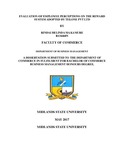Please use this identifier to cite or link to this item:
https://cris.library.msu.ac.zw//handle/11408/3043| Title: | Evaluation of employee perceptions on the reward system adopted by Telone pvt ltd | Authors: | Makamure, Rindai Belinda | Keywords: | Employee perceptions Reward system |
Issue Date: | 2017 | Publisher: | Midlands State University | Abstract: | The study aimed at evaluating employee perceptions on the reward system adopted by Telone Pvt Ltd. It was motivated by the continuous decrease in employee performance through poor revenue collection ,poor customer service and prolonged time in fixing faults even in the presence of a reward system . The study examined the effectiveness of the reward system, its effect on employee perceptions and the challenges of the current reward system. Literature put forward by different scholars and authors regarding the main elements of a reward system, factors affecting reward systems, effect of reward system on performance and the challenges of reward systems were critically reviewed. The research gathered data from two main sources namely secondary and primary sources. The two main techniques employed in gathering the primary data were questionnaire survey and interviews. The study applied descriptive research design to evaluate on how employees perceived the reward system adopted by Telone. Stratified random sampling technique was employed to adequately incorporate views from different angles since research subjects were drawn from different stratas (senior management, departmental supervisors, credit control employees, sales department employees and technical department employees). A sample size of 79% of the target population was obtained from a list of appropriate sample sizes that are good enough to produce credible findings calculated by Krejcie and Morgan (1970).The study findings revealed that there were different types of rewards offered to employees in the organization but some of the rewards were perceived as demotivating by the respondents. The results also indicated that the reward system affects the performance of employees either positively or negatively depending on how employees perceived the reward system. When employees have positive perceptions on the reward system their performance increases and when they have negative perceptions performance decreases. Majority of respondents indicated that reward stimulates them to work harder and they are prepared to work harder if they are given more incentives or paid more. It was also revealed from the study that the effectiveness of a reward system depends on the extent to which it can retain its employees and motivate them to perform at their best. In the case of Telone, the reward system was found to be ineffective. In light of the study findings it was recommended that employees should be involved in the formulation of the reward system through employee opinion surveys to help design a good reward system for the various job classes and departments in the organization. Telone’s reward system should be clear and easily understood, it should have bearing on organizational goals, be fairly administered and aim at ensuring equity among the total workforce. | URI: | http://hdl.handle.net/11408/3043 |
| Appears in Collections: | Bachelor Of Commerce Business Management Honours Degree |
Files in This Item:
| File | Description | Size | Format | |
|---|---|---|---|---|
| RMAK DIS FINAL FINAL chaiyo RINDAI.pdf | Full Text | 1.39 MB | Adobe PDF |  View/Open |
Page view(s)
222
checked on Apr 13, 2025
Download(s)
196
checked on Apr 13, 2025
Google ScholarTM
Check
Items in MSUIR are protected by copyright, with all rights reserved, unless otherwise indicated.



